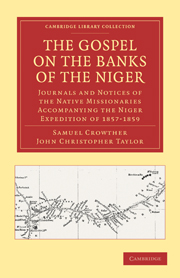 The Gospel on the Banks of the Niger
The Gospel on the Banks of the Niger Book contents
- Frontmatter
- PREFACE
- Contents
- Journal of the Rev. S. Crowther
- Journal of the Rev. J. C. Taylor at Onitsha
- Canoe-passage from Onitsha to Rabba to the Rev. S. Crowther
- Appendix I Table of Expenses of ditto
- Appendix II Notices of Onitsha, &c., by the Rev. S. Crowther
- Appendix III Ibo Proverbs collected by the Rev. J. C. Taylor
Journal of the Rev. J. C. Taylor at Onitsha
Published online by Cambridge University Press: 07 September 2011
- Frontmatter
- PREFACE
- Contents
- Journal of the Rev. S. Crowther
- Journal of the Rev. J. C. Taylor at Onitsha
- Canoe-passage from Onitsha to Rabba to the Rev. S. Crowther
- Appendix I Table of Expenses of ditto
- Appendix II Notices of Onitsha, &c., by the Rev. S. Crowther
- Appendix III Ibo Proverbs collected by the Rev. J. C. Taylor
Summary
Having closed all business connected with my station at Bathurst, I preached a farewell sermon on Sunday, the 26th of April, 1856, to an overflowing congregation, from Phil. i. 20; in the evening, from Acts xx. 32. On this occasion I entered fully into the minds of faithful pastors on such seasons of separation from their respective flocks on the eve of their departure to distant lands. I could very well read their countenances, which evidenced true marks of filial love and affection. The Mission-house was crowded with old men and women, who came to bid me farewell, heaping up blessings on the Church Missionary Society, for their generous efforts in sending the harmonizing gospel to the Ibos. An old man, whom I have known as a communicant from my boyhood, stood in my parlour before the young men, and those who were present at the prayer-meeting which we kept during the night, raised his worn-out countenance to heaven and burst out with the following expressions of joy–“Thank God, thank God! Go, my son, and tell the happy news to the heathen. Oh, is this word true, that our children too can go out like white men and preach the gospel ? If any one had told us this word in bygone years, who would believe it ? Lord, send plenty of our children more ; go, do not fear, people will talk plenty word and say, They will kill you, they will eat you. The Bible says, ‘the hairs of your head are all numbered.’ Ah, who can thank the Church Missionary Society ? Who can pay them for their goodness to poor Africans ? No man on earthnone but GOD.”
- Type
- Chapter
- Information
- The Gospel on the Banks of the NigerJournals and Notices of the Native Missionaries Accompanying the Niger Expedition of 1857–1859, pp. 241 - 384Publisher: Cambridge University PressPrint publication year: 2010First published in: 1859


